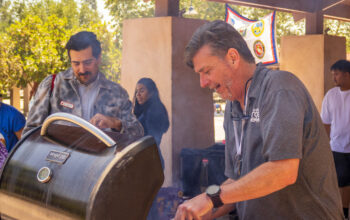The ocean covers 71 percent of the Earth’s surface, and to protect the serenity of marine life, the Vegan Society is taking a stand with the help of others.
Sea Shepherd Conservation Society, established in 1977, is a non-profit marine wildlife conservation organization with the mission to end the destruction of habitats, slaughter of wildlife and to protect the ocean, according to their mission statement.
The Sea Shepherd Conservation Society of Los Angeles presented their film, “Why Just One?,” to Pierce College students on Nov. 19 from 5 – 7 p.m. in the Great Hall. This film focuses on sea turtles and their species coming to an end due to various reasons, including poaching.
The Vegan Society and the Sea Shepherd Conservation Society collaborated on this event to bring awareness of the dangers against sea turtles. The Vegan Society has been focusing on marine life this semester and faculty advisor of the club, Stephanie Winnard, thought the film would have a great impact on the students.
“Our outreach is to spread awareness of the problem of bycatch caused by the fishing industry,” Winnard said. “We also endorse Prop. 67 as a club and did an outreach about that, which deals with the plastic bag ban. In the film, the plastic pollution is a huge problem for marine wildlife and marine wildlife actually die as a result of plastic pollution.”
Sea Shepherd Conservation Society and Winnard have worked together last year’s Earth Day. They thought that the new film presented gave an outlook to attendees about the threats the sea turtles are facing.
Sea turtles are facing the most danger in coastal areas such as Costa Rica, Honduras and Florida. Of 1,000 sea turtle hatchlings, only one will survive maturity, according to the documentary.
Winnard enjoyed watching the film and believed that the important message was to educate children about the plight of sea turtles.
“One reason why I’m so passionate is because of future generations,” Winnard said. “I want there to be life left on the ocean for future generations to enjoy. It always starts with awareness. It is always the first step to create positive action or any positive change. Hopefully by spreading awareness and bringing this to people’s attention it will bring inspiration to find out more about what they can do.”
According to Winnard, a helpful way to save marine life is by going vegan. One of the biggest issues the sea turtles deal with is the fishing industry. The turtles are caught in nets as bycatch. They are unintentionally caught while fishermen are attempting to catch certain target species and target sizes. Bycatch is either a different species, the wrong sex, or is undersized or juvenile individuals of the target species.
Winnard said that this can be avoided all around by sustaining a vegan diet. The Vegan Society has future plans including the Valentine’s Day vegan bake sale, Earth Day, vegan potlucks, film screenings and inviting speakers to campus.
Alicia Salazar, secretary of the Vegan Society, agrees with the issue of plastic and garbage in the ocean. Salazar explains how sea turtles eat jellyfish and confuse them with the plastic bags people throw in the ocean. This causes the garbage to get clogged in the sea turtles’ throats and die.
Salazar also discussed poaching and how people take the turtles from the ocean and cut them out either for their meat, shells, jewelry or as trophies. In addition to both of these problems, there are also climate changes that are affecting the sea levels and the habitats of these species.
“When they make documentaries like this, they want to let the world know what’s happening and therefore what we can do,” Salazar said. “These sea turtles need someone there all night because that way no poachers come and eat their eggs or kill them. I think it’s great that the film allows people to know how they do it and what their donations can do for this organization.”
David Hance, the chief operating officer for the Sea Shepherd Conservation Society, became passionate about joining this organization when he attended an animal rights conference in 2008.
“I was amazed that people would spend their own time and volunteer to go around the world to save animals. I’ve been a big lover of the ocean my whole life, so at that point I knew I had to find out a way to get involved. That’s when I started volunteering,” Hance said.
According to Hance, the Sea Shepherd Conservation Society has a total of nine ships around the world that go out and protect various animals in the ocean. Hance also thinks that bringing awareness to any issue is going to wake people up who are unaware of the destruction of biological life.
“The one thing I want students to take away is how much of an impact the generations before them have already had on the planet,” Hance said. “You guys are the next generation, so if there is any charge that the older people can give to you, it’s to please try to clean up the mess that my generation and the previous generations have created with the ocean and the planet.”



